We're movingpublished at 04:44 GMT 23 November 2023
Thanks for staying with us. We're moving to a new live page and you can follow our coverage here.
A senior Israeli official has said hostages being held in Gaza won't be freed before Friday
A pause in fighting was expected to begin on Thursday, but an Israeli government source told the BBC it has also been delayed
The Israeli foreign minister earlier said he expected the first hostages to be received on Thursday
Under the planned agreement, 50 Israeli hostages taken by Hamas will be released and 150 Palestinian women and teenagers held in Israeli jails freed
Israel has continued its ground and air operation in Gaza - and Prime Minister Benjamin Netanyahu has vowed to win "absolute victory" over Hamas
Israel began attacking Gaza after Hamas fighters crossed the border on 7 October, killing 1,200 people and taking about 240 others hostage
Gaza's Hamas-run health ministry says more than 14,000 people - including more than 5,000 children - have been killed in Israel's campaign
Edited by Alex Binley
Thanks for staying with us. We're moving to a new live page and you can follow our coverage here.
Hostage deal: A hotly anticipated hostage deal between Hamas and Israel - which includes a four-day pause to fighting - has been left up in the air. Hamas had announced there'd be a four-day pause beginning at 10am on Thursday - but an Israeli source has since told the BBC there's been a setback.
It came after a security adviser to the Israeli government said there'd be no Israeli hostages released by Hamas before Friday.
Criticism of pause time: Families of those being held in Gaza have said every captive "needs to come home", but the UN's Palestinian refugee agency Unrwa said a four-day pause - in which more aid would be allowed to go into the enclave - is simply not enough.
Aid crisis: Lorries carrying aid are now queuing up at the Rafah crossing from Egypt into Gaza in anticipation of the pause in hostilities. Earlier, the executive director of Unicef - the UN's agency for children - said Gaza now faces a crisis of "child wasting" - a term used to describe the most life-threatening form of malnutrition.
Fighting continues: On the ground, Israel has continued its ground and air operation in Gaza - and Prime Minister Benjamin Netanyahu has vowed to win "absolute victory" over Hamas. Meanwhile, Israeli defence minister Yoav Gallant said Israel is "slowly but surely" dismantling the military framework of Hamas.
What happens now? Our colleagues on the ground are continuing to gather information about the hostage deal and what its potential delay means.
Five members of Hezbollah - the powerful Iranian-backed militia in Lebanon - have been killed in an Israeli strike in Beit Yahoun, south Lebanon, according to the Shia Islamist group.
Abbas Raad, son of senior Hezbollah figure and Lebanese lawmaker Mohammad Raad was one of them, the group says.
According to Reuters news agency, a total of 85 Hezbollah fighters have now been killed since violence broke out along the Israel-Lebanon border.
Israel's army said it struck several Hezbollah targets in Lebanon on Wednesday evening, including "terror infrastructure" and "terror cells" that tried to launch rockets into Israel and fired at Israeli troops.
Hezbollah is the largest political and military force in Lebanon. It is classed as a terrorist organisation by the UK, US and the Arab League.
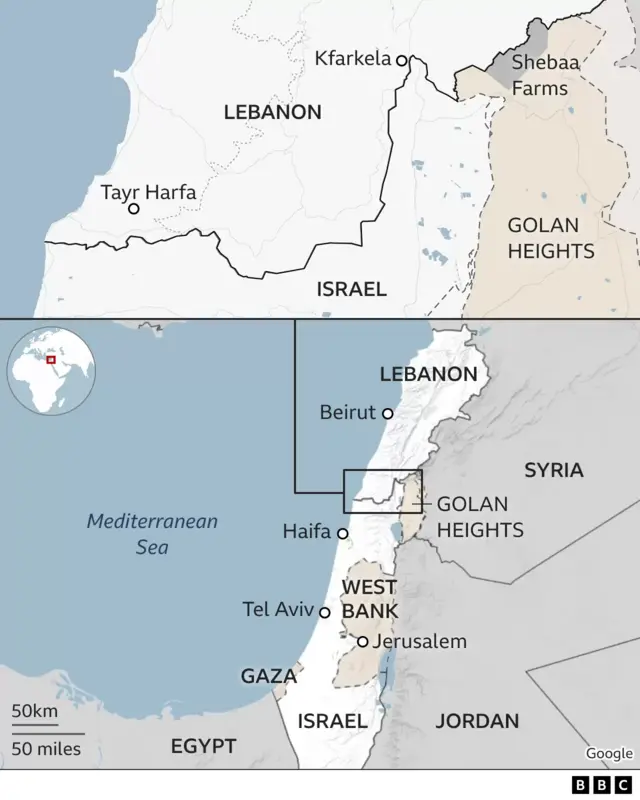 Image source, .
Image source, .As we've been reporting, the agreed pause in fighting is yet to begin - and Palestinian news agency Wafa has reported dozens of people killed in Israeli attacks on Wednesday.
The foreign minister of the Palestinian Authority (PA), Riyad al-Maliki, has said 52 of those killed in the Jabalia refugee camp in northern Gaza on Wednesday morning belonged to the same family.
"Only this morning, from the Qadoura family in Jabalia, 52 people have been wiped out completely, killed," he said during a trip to London.
"I have the list of the names, 52 of them, they were wiped out completely from grandfather to grandchildren."
The BBC has not been able to verify this independently. As a reminder, the PA is based in the occupied West Bank and is entirely separate to Hamas.
As we reported earlier, the Israel Defense Forces (IDF) said it had encircled the city of Jabalia in northern Gaza. Pictures from the Jabalia refugee camp show badly damaged buildings.
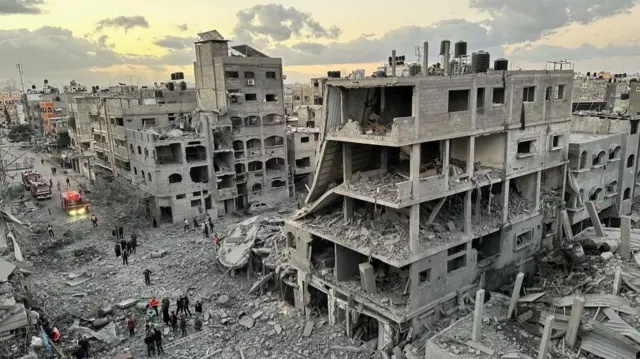 Image source, Reuters
Image source, ReutersThe IDF says it hit around "around 250" Hamas targets in the past day, including three underground tunnels in the Jabalia area
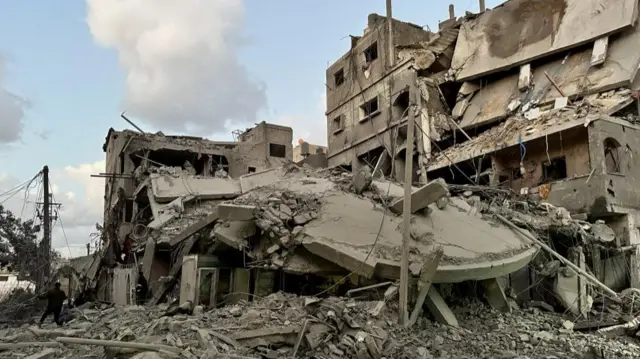 Image source, Reuters
Image source, Reuters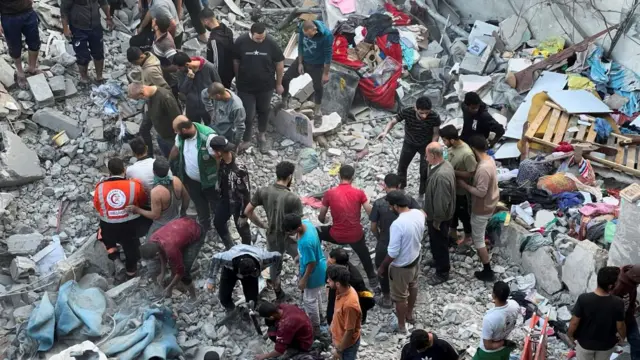 Image source, Reuters
Image source, ReutersPeople are pictured searching for casualties amid the rubble of destroyed buildings
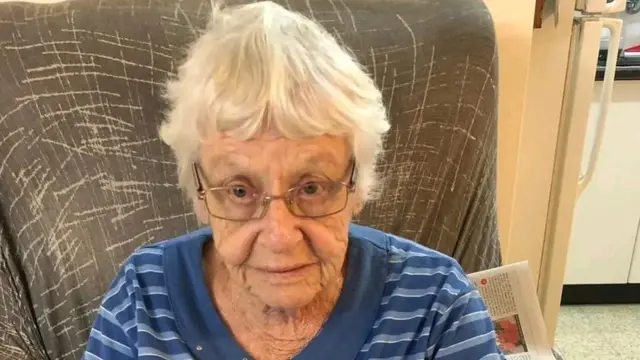 Image source, Ditza Heiman family
Image source, Ditza Heiman familyThe BBC has been tracking reports and stories of the people taken hostage by Hamas.
It says it has hidden the hostages in "safe places and tunnels" within Gaza. Israel Defense Forces have previously said the hostages include children, and between 10 and 20 over-60s.
One of those was Ditza Heiman, 84.
She was seen by a neighbour at kibbutz Nir Oz being led away by Hamas gunmen, her niece said.
A former social worker, she is the widow of Zvi Shdaimah, who came to the UK on the Kindertransport, the organised rescue of children from Nazi-controlled areas during World War Two.
You can read more stories of the hostages here.
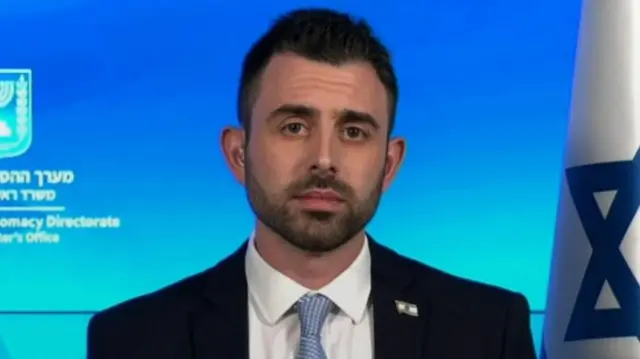
A little earlier and before we got the news that the release of some hostages and pause in fighting will not take place before Friday, a spokesperson for the Israeli government spoke to our colleagues on the BBC News channel.
Asked what he made of the hostage deal that's been agreed between Hamas and Israel, Eylon Levy described it as a "very difficult situation" - and said it won't be easy for Israel to let "terrorists" go.
As part of the deal, which will see a four-day pause in the fighting - now not expected to begin before Friday - Hamas will release 50 Israeli hostages taken during the 7 October attacks in exchange for 150 Palestinian women and teenagers who've been held in Israeli jails.
Levy says some of the people being released have committed "security offences" - including "stabbing and shooting attacks". Despite this, he says, the government believes this is the right move to get hostages being held home.
"We have an obligation as a country to bring them home safely," Levy says. "We're looking forward to seeing them come home."

 Tom Bateman
Tom Bateman
Middle East correspondent, in Jerusalem
The sense had been all day in Israel that, according to the agreement, it would be 10:00 local time on Thursday (08:00 GMT) that a ceasefire would begin.
A couple of hours after that, you'd get the release of the first batch of hostages held by Hamas - and then Palestinian prisoners held by Israel would also be freed.
But more uncertainty appeared when Daniel Hagari, the chief spokesman for the Israeli military, gave a briefing a few hours ago and said he didn’t know what time a ceasefire might start.
We've now heard the head of Israel's National Security Council say that the negotiations are progressing and continuing - but hostages won't be released before Friday.
That appears to be quite a significant delay - anything from 24 hours or even beyond - to plans that had been widely briefed and which we understood would be taking place tomorrow.
 Orla Guerin
Orla Guerin
Reporting from Jerusalem
An Israeli government source has told the BBC that the ceasefire has also been delayed.
 Orla Guerin
Orla Guerin
Reporting from Jerusalem
This is certainly a change at the 11th hour. Israel was gearing up for a hostage release as early as tomorrow morning.
There are conflicting reports here about what has caused the setback; some claims that Hamas has not ratified the ceasefire agreement.
Other reports say Hamas has not provided Israel with a list of the hostages who were to be released on the first day. And that mechanism is supposed to be part of the agreement.
An Israeli government source told me in the last half hour that they believed these were relatively minor issues which need to be ironed out, and that they would be ironed out on Thursday. That suggests that things would be back on track on Friday if that is the case.
But what we can say for certain is that this is an awful blow to the families. They’ve been waiting almost 50 days, hoping that tomorrow was finally going to bring a moment of hope.
Now once again they have to deal with uncertainty. And I think many of them will believe this deal is only happening when they see it.
In the last few minutes, Tzachi Hanegbi, head of the National Security Council of Israel, has said Israeli hostages will not be released by Hamas before Friday.
"The negotiations for the release of our hostages are advancing and continuing constantly," he adds in a statement released by the office of Israeli PM Benjamin Netanyahu.
It was announced last night that Israel and Hamas had reached a deal to exchange 50 of the hostages held in Gaza for a four-day pause in fighting.
The agreement will also see 150 Palestinian women and children held in Israeli jails released and an increase in humanitarian aid allowed into Gaza.
We've been hearing from the UN's Palestinian refugee agency Unrwa about its hopes for the four-day pause in fighting under the Israel-Hamas deal.
The agency is currently hosting close to a million people in its shelters, a spokeswoman has told the BBC.
Tamara Alrifa says the agency needs to be able to go to the northern part of Gaza - an area that Israel has urged Gazans to leave for their own safety. It will be able do so during the pause in fighting "if the Israeli authorities give us security guarantees".
Alrifa says Unrwa would like to send mobile clinics into shelters and distribute bread, flour and drinking water in the north, as it has been doing in the south, but four days is "definitely not enough for the scale and scope of the humanitarian catastrophe".
She says the 200 trucks carrying aid that will be allowed in each of the four days are "very insufficient", given that around 500 trucks used to enter Gaza per day.
The four fuel tankers permitted to enter under the deal will bring about half of what Unrwa needs to run its trucks, electricity generators, water pumping and desalination plants, and to provide fuel to hospitals and bakeries, she adds.
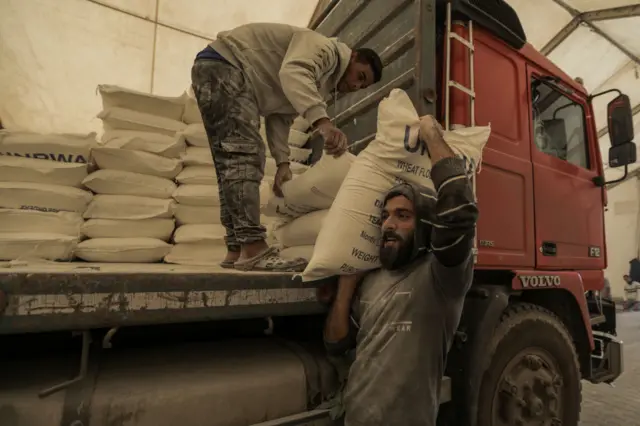 Image source, Getty Images
Image source, Getty ImagesUnwra flour being distributed in Khan Younis in the southern Gaza Strip today
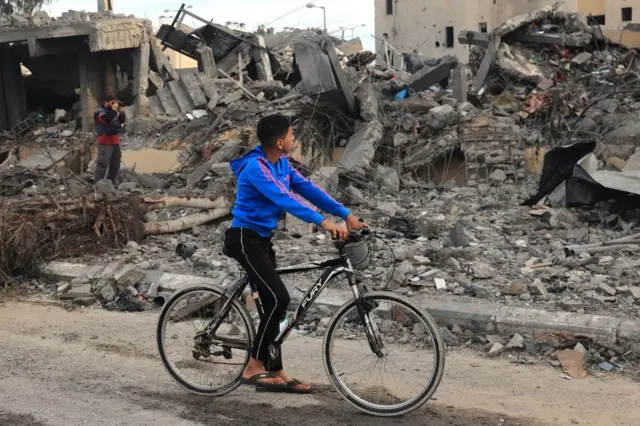 Image source, Getty Images
Image source, Getty ImagesA boy cycling through the Gazan city of Rafah today
Back to the situation in Gaza Strip itself now. The executive director of Unicef - the UN's agency for children - says the territory faces a crisis of "child wasting": a term used to describe the most life-threatening form of malnutrition.
In an article published in the New York Times, external today, Catherine Russell said Unicef was projecting that the rate of child wasting would increase 30% in the next few months - and there were already more than 7,000 cases before the events of 7 October. She added that these were conservative estimates, and the figure could rise as the conflict continued.
Severe wasting means even catching a common cold could be life threatening, Russell explained.
It's hoped that the hostage deal agreed by Israel and Hamas - following negotiations backed by Qatar and the US - will allow hundreds of lorries carrying aid to enter Gaza over four days.
Russell says to ensure Gaza's children remain healthy and stave off looming health issues, humanitarian partners must be permitted to deliver supplies after hostilities resume.
As we just reported, Israeli Prime Minister Benjamin Netanyahu says humanitarian workers from the International Committee of the Red Cross (ICRC) will be able to visit hostages in Gaza who are not being released under the imminent deal between Israel and Hamas.
Netanyahu disputed an earlier comment from the ICRC - which said the organisation hadn't received any information about visiting hostages in Gaza.
In its statement (quoted by Israeli media) the ICRC said it had continuously asked for the release of all hostages and for their humane treatment since the brutal 7 October attack. But, it added:
Quote MessageThus far, the ICRC has not been made aware of any agreement reached by both parties related to visits by the ICRC to the hostages. Should visits be agreed upon, the ICRC stands ready to visit. The ICRC does not take part in the negotiations between the parties to the conflict."
International Committee of the Red Cross
We've approached the ICRC for comment on those latest comments from Netanyahu.
During that press conference, we also heard Israeli Prime Minister Benjamin Netanyahu say it's been agreed that humanitarian workers from the International Committee of the Red Cross (ICRC) will be allowed to visit remaining hostages in Gaza.
"I expect the Red Cross to do its job, and to visit them all and to bring them the medication that they need," he said.
We're now hearing from Israeli defence minister Yoav Gallant, who says the Israel Defense Forces (IDF) has been working very hard in the Gaza Strip - from land, air and sea.
Gallant says Israel is "slowly but surely" dismantling the military framework of Hamas.
The defence minister says he recommended to the Israeli parliament that the IDF should go further into Gaza - to show Hamas the powers of Israel's military and rescue hostages.
He says that he "sincerely" hopes that the hostage release agreement "will be actually executed". And he hopes the results of negotiations will be seen in "next few days".
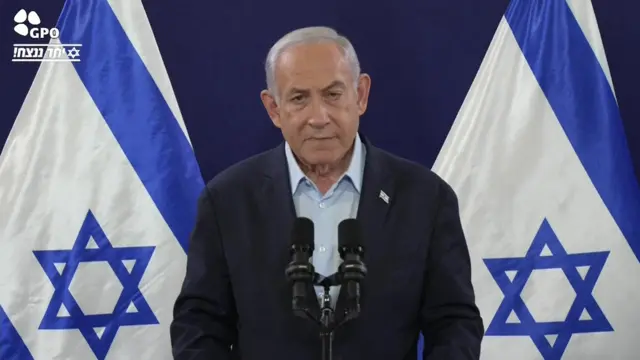 Image source, Israel Government Press Office
Image source, Israel Government Press OfficeNetanyahu says Israel will continue to fight Hamas in the north and in the south, which has only been possible "thanks to the heroism and the courage of our children".
He adds: "This victory has a very heavy price to pay," and acknowledges that some members of the Israel Defense Forces (IDF) will die during the war.
He says he has been told by the families of soldiers killed in combat to continue fighting.
Netanyahu says he expects some mothers and children to be released.
"There were various things we just had to do," Netanyahu adds. He says in his job he sometimes has to make "extremely tough" decisions.
He says Israel is taking advantage of every possible chance to bring hostages safely home.
The PM says he was reassured during meetings yesterday that the safety of Israeli soldiers will be guaranteed during the "temporary truce".
The Israeli military will then continue its campaign against Hamas, he says.
Israeli Prime Minister Benajmin Netanyahu is first up, and addressing the public.
He repeats that the aims of this war are to release the hostages and eliminate Hamas.
Netanyahu says he would like to "truly salute the IDF" (the Israeli military) for its work, and role in the war so far.
Talking about the conditions of the hostage release, he says no murderers will be released from Israeli jails.
Israeli Prime Minister Benjamin Netanyahu, minister Benny Gantz and defence minister Yoav Gallant are addressing the public in a news conference.
We expect to hear more from Israel ahead of the much-awaited four-day pause in fighting - to allow for Israeli hostages held by Hamas to be freed, and for Israel to release Palestinian prisoners.
They're speaking from Tel Aviv. Stick with us as we bring you the latest.